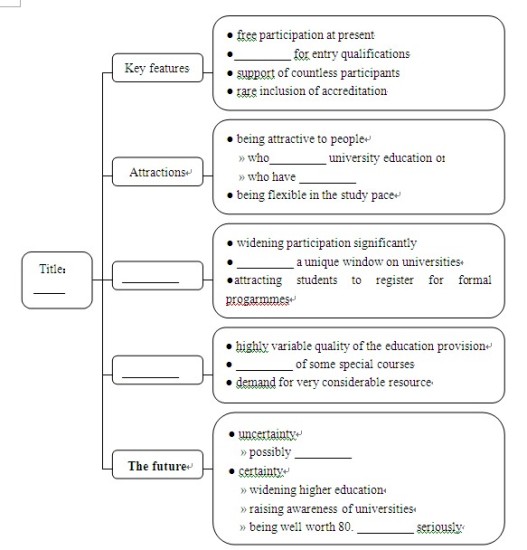—No,sir.I___a newspaper.
| A.read | B.was reading |
| C.would read | D.am reading |



A. Time can run out.
B. Tomorrow won’t be better.
C. Ideas need time to develop.
D. Your professor will be impatient.
E. You blow off your chances for help.
F. You are probably overestimating (高估) the pain.
Never Put off Tomorrow What You Can Do Today
Want to put off studying for the physics test? Or writing that thirty-five-page research paper on future uses of biotechnology? Sure you do? And who wouldn’t? But it’s still a silly idea to put off doing something until a future time. Here is why ....
1. __________. The task will be still the same. It won’t be any more fun and you still won’t want to do it. As the deadline gets closer and closer, the task seems to become larger and larger if you haven’t started the work. And the stress increases. Now not only do you have to write that paper, you have to do it under great pressure.
2. _________ . Before you start, it seems that the task is unlikely to be accomplished. But you know what? You’re probably miscalculating. Get started -------- maybe on a small piece ------ And you will discover that you have more resources and know more about the subject than you thought. Result? You won’t experience nearly as much suffering as you expected to. Things are guaranteed ------ 100 percent ------- to get better.
3. _____________ . If you leave your work before the night before it’s due, you give up the possibility of getting input from your professor. Professors regularly give advice ----- or at least a few useful tips ---- during office hours. Unfortunately though, they don’t usually hold office hours at midnight, so you will be out of luck when you discover the night before the midterm that you have no idea how to do the questions that will count for two-thirds of your grade.
4. ________ . Ever wonder why the professor assigns the papers two weeks before it’s due? It’s because he or she expects you to be thinking about the issue, or doing the research, for two weeks. No, not every waking moment, but at least some of the time. After all, the professor could just as easily have given the assignment one week before it was due if he or she expected less thinking. When you throw together a paper or a report at the last minute, your ideas are half-baked. And your professor will know it.
5. ________ . If you put things off at the last minute, you might find that you haven’t budgeted enough minutes to finish the necessary tasks. It’s the easiest thing in the world to miscalculate how long it will take to do all the work especially when new issues arise ------ like illness, family problems, computer breakdowns, trouble at work, and all the other things ------- as you are thinking through your paper argument or preparing yourself for the coming test. If you keep delaying, you don’t allow yourself time for those various life events that have an adverse (不利的) effect on your ability to complete your assignment.
Currently offered by some famous universities, MOOCs are attractive to people who do not have the financial resources to meet the growing costs of university education, or who do not have formal qualifications. They also allow participants to study at their own pace.
The potential for MOOCs to deliver education is obviously vast—they could be considered as a huge step forwards in widening participation. They also have the potential to provide a unique window on universities that offer popular and valuable courses, they may attract some participants to register for formal fee-paying programmes at the same or other universities and are likely to promote new ways of on-line education.
However, it is still very early days for MOOCs. The quality of the education provision is highly variable, with many courses offering only recordings of lectures, and delivery is particularly difficult in some special fields that require practical classes, research projects or extensive library access. Besides, wider engagement with participants requires very considerable resource. Even limited feedback or examination becomes a major task if there are several thousand students in the class.
Considering the challenges, some people argue MOOCs will soon evaporate (蒸发). But they certainly provide good opportunity for widening higher education, are a means of raising awareness of universities to audiences of tens or hundreds of thousands, and are well worthy of serious consideration.

Gift Giving
1.
There are many occasions(场合)for giving gifts in modern industrialized societies: birthdays, naming ceremonies, weddings, anniversaries, New Year. It is common to give gifts on many of these celebrations in western cultures. In addition, special events, such as one’s first day of school or graduation from university, often require gift giving.
2.
What is happening when we give gifts? Most important, we are exchanging gifts. If someone gives me a gift for my birthday, I know that I am usually expected to give one on his or her next birthday. A gift builds up or confirms a social obligation(义务).
3.
Gifts tighten personal relationships and provide a means of communication between loved ones. People say that a gift lets the recipient(接受者)know we are thinking of them, and that we want to make the person “feel special.” We want people to feel wanted, to feel part of our social or family group. We give presents to say “I’m sorry.” Sometimes it is difficult for us to find a present that someone will like. Sometimes we give things that we like or would feel comfortable with. In all these cases, the gifts are sending out messages—often very expressive ones.
4.
People tend to talk about presents in a fairly loving way. A woman whose mother had died years ago described the many gifts around her house. These were gifts that her mother had given her over the years: “I appreciate these, and they mean something to me,” the woman said, “because I remember the occasions they were given on, and that they were from my mother, and the relationship we’ve had.” The gifts remain and keep the relationship alive in mind. This woman felt the same way about the gifts she gave to others. She hoped that the recipients would look at her gifts in years to come and remember her.
5.
Emotions (情感) like these suggest that a positive spirit still lies behind gift giving. They prove that the anthropologist Claude Levi-Strauss was wrong to say that modern western gift giving is highly wasteful. Studies in Canada and elsewhere have also shown that this is not the case. Each gift is unique even if so many are given. The emotional benefit for those who exchange gifts is the very reason for the tradition to continue.
| A.Gift giving proven to be valuable |
| B.Memories from gift giving |
| C.Moments and events for gift giving |
| D.Various functions of gift giving |
| E.Gift giving as a wasteful practice |
| F.Gift giving as a two-way social activity |
1. again
| A.cabbage | B.narrow | C.famous | D.tradition |
| A.measure | B.upstairs | C.respect | D.sugar |
| A.machine | B.invite | C.terrible | D.bitter |
| A.amount | B.trouble | C.shoulder | D.group |
| A.thunder | B.worthy | C.neither | D.clothes |
从每小题的A、B、C、D四个选项中,找出其画线部分与所给单词的画线部分读音相同的选项,并在答题卡上将该项涂黑。
1. success
A. officical B. excuse
C. correct D. exciting
2. society
A. achieve B. friend
C. science D. believe
3. theirs
A. thread B. smooth
C. thirsty D. health
4. raise
A. remain B. certain
C. mountain D. bargain
5. compare
A. company B. continue
C. common D. concert
A woman id her sixties lived alone in her little cottage with a pear tree at her door. She spent all her time taking care of the tree. But the children nearby drover her 21 by making fun of her. They would climb her tree and then run away with pears, 22 “Aunty Misery” at her.
One evening, a passer by asked to 23 for the night. Seeing that he had an 24 Face, she let him in and gave him a nice 25 . The next morning the stranger, actually a sorcerer (巫师), thanked her by granting (允准) her 26 that anyone who climbed up her tree 27 not be able to come back down until she 28 it.
When the children came back to steal her 29 , she had them stuck on the tree. They had to beg her
long 30 she gave the tree permission to let 31 go. Aunty Misery was free from the 32 at last.
One day another man 33 her door. This one did not look trustworthy to her, 34 she asked who he was . “I am Death, I’ve come to take you 35 me.” said he.
Thinking fast Aunty Misery said, “Fine, but I’d like to 36 some pears from my dear tree to remember the 37
it brought to me in this life. But I am too 38 to climb high to get the best fruit. Will you be so 39 as to do it for me?” With a deep sigh, Mr. Death climbed up the tree 40 and was immediately stuck to it. No matter how much he warned or begged, Aunty Misery would not allow the tree to let Death go.
21. A. hopeless B. painful C. dull D. crazy
22. A. calling B. shouting C. announcing D. whispering
23. A. stay B. live C. hide D. lie
24. A. interesting B. honest C. anxious D. angry
25. A. gift B. kiss C. treat D. smile
26. A. suggestion B. demand C. permission D. wish
27. A. could B. should C. might D. must
28. A. permitted B. promised C. answered D. declared
29. A. branch B. food C. tree D. fruit
30. A. after B. while C. since D. before
31. A. it B. them C. him D. her
32. A. trick B. question C. trouble D. difficulty
33. A. stepped into B. left for C. stopped at D. walked around
34. A. so B. but C. although D. because
35. A. with B. off C. upon D. for
36. A. choose B. pick C. shake D. hit
37. A. honor B. pleasure C. hope D. excitement
38. A. light B. short C. old D. thin
39. A. proud B. kind C. fine D. smart
40. A. disappointedly B. cheerfully C. unwillingly D. eagerly
1. course
| A.journey | B.four | C.labour | D.hour |
| A.separate | B.marry | C.machine | D.many |
| A.purse | B.else | C.praise | D.mouse |
| A.faith | B.cloth | C.maths | D.smooth |
| A.certain | B.train | C.against | D.contain |



